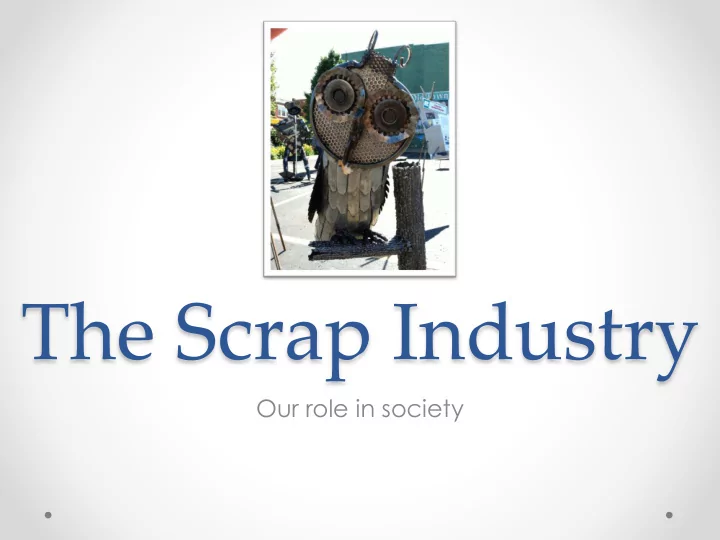

The Scrap Industry Our role in society
A Little About Us…
A Little About Us…
A Little About Us… • We are, and have always been, an important part of the economic and environmental solution , not the problem. • We’ve been recycling long before the word recycling was around.
What We Do
What We Do A vital part of the recycling process After Obsolescence Before Re-Melt
What We Do A vital part of the recycling process
What We Do We purchase most of this material
What We Do • Why do we pay for scrap material? • How do these commodities get their values? Remember: Material is recyclable because it has value ; a future purpose. So, what does that mean?
What We Do • Why do we pay for scrap material? • How do these commodities get their values? Mill or Manufacturer Foundry Public Scrap-Processor
What We Do • Why do we pay for scrap material? • How do these commodities get their values? • Google and Apple NASDAQ o • Aluminum London Metal Exchange (LME) o • Copper Commodities Exchange (COMEX) o
What We Do • Why do we pay for scrap material? • How do these commodities get their values? Market Price Mill Price Scrap Price
What We Do For the Economy The scrap industry processes around 135 million • metric tons of scrap material annually. That material is ultimately used to make new • products , like cars, buildings, chairs, books, newspaper, computers, etc. Our industry directly employs around 138,000 • people (463,000 people total), produces around $90 billion in annual sales, and around $10.3 billion in annual federal, state, and local tax revenue. It exists because of the cost saved from using • scrap to make new products, rather than mining virgin material out of the ground. If the scrap industry didn’t exist, our products • would be far more expensive!
What We Do For the Environment Energy saved by using • scrap material instead of virgin material: Steel: (56%) o Copper: (90%) o Aluminum: (92%) o Paper: (68%) o Plastic: (87%) o If the scrap industry didn’t • exist, society would solely mine virgin material out of the ground, which would further deplete the Earth’s natural resources.
Thank You For Listening! Q & A Mike Bass: mbass@friedlandindustries.com
Recommend
More recommend